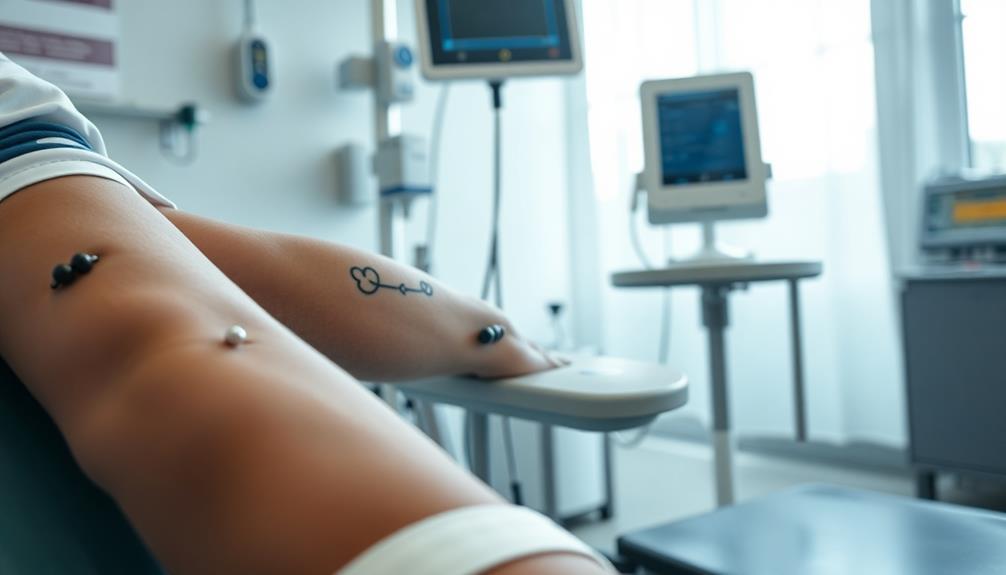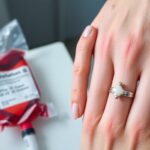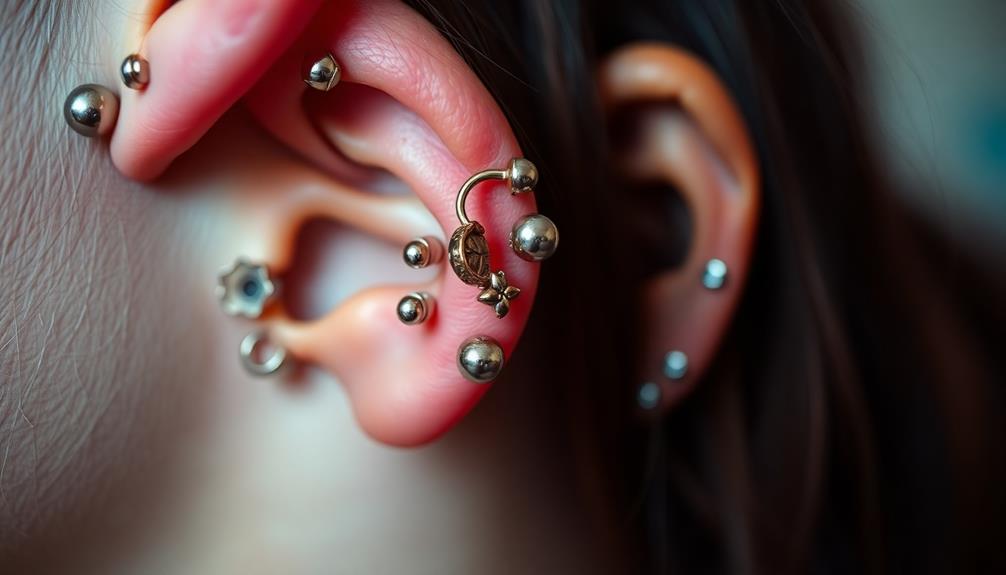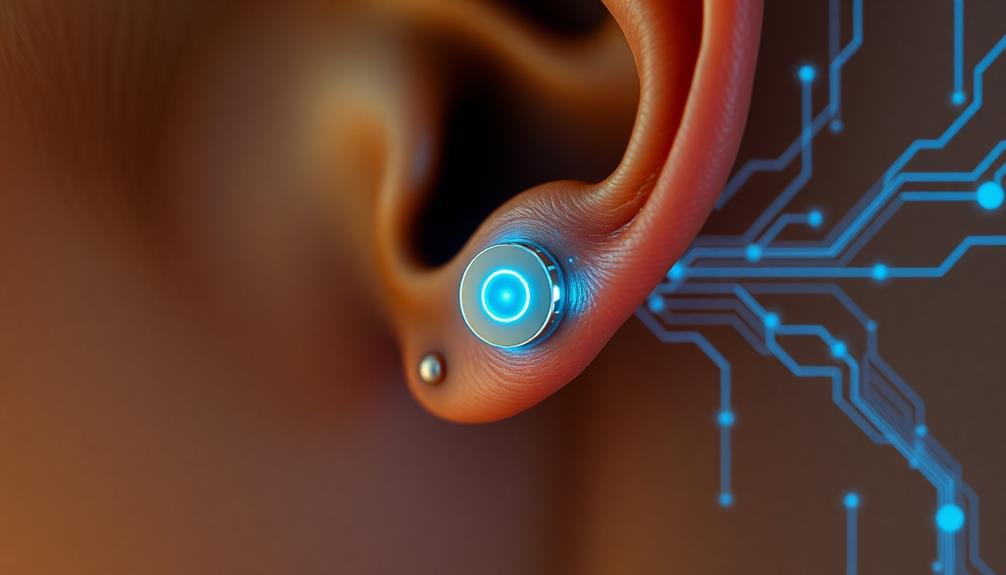Piercings can affect your eligibility to donate blood, often requiring a waiting period. If you've had a new body piercing, you need to wait three months before donating. However, if your ear piercing was done at a regulated facility, you can donate after just 24 hours. If single-use equipment was used and your piercing is fully healed, you might donate sooner. Always verify the piercing method and follow proper aftercare to minimize infection risks. Understanding these guidelines guarantees your safety, and there's more helpful information available to guide you through the donation process.
Key Takeaways
- New body piercings require a three-month wait before donating blood due to infection risk.
- Ear piercings done at regulated facilities allow plasma donation after just 24 hours.
- If a piercing is done with single-use equipment and is fully healed, immediate donation is possible.
- Reusable instruments used for piercings necessitate a three-month waiting period to ensure safety.
- Proper aftercare and verification of healing are essential for maintaining eligibility to donate blood.
Overview of Blood Donation Eligibility

When you consider donating blood, understanding the eligibility criteria is vital. Body piercings can play a significant role in determining whether you can donate. If your piercing was done with reusable instruments or if you're unsure about the equipment used, you'll need to wait three months before donating. This waiting period is a precaution to guarantee your safety and health standards are met.
On the other hand, if your piercing was completed with single-use, disposable equipment from a regulated facility and it's fully healed, you can donate blood immediately. It's important that any piercings are completely healed, as active healing may increase the risk of infection and complications, both for you and for those receiving your blood.
Therefore, before you head to a donation center, verify your eligibility if you've had recent body piercings. Adhering to these guidelines not only protects your health but also aligns with the safety and health standards expected in blood donation.
Understanding these criteria helps guarantee a safe and successful donation experience for everyone involved.
Impact of Piercings on Donation
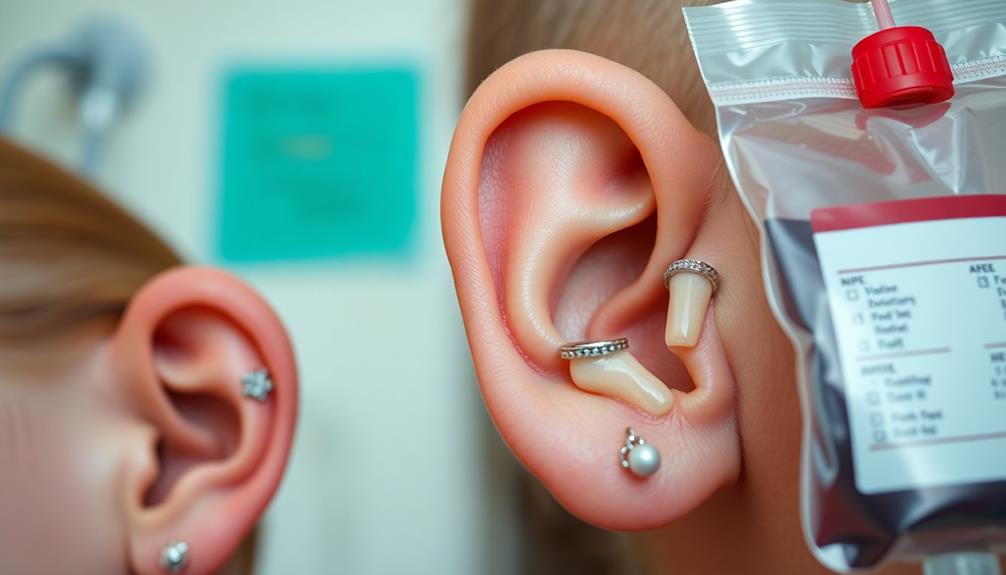
Understanding the impact of piercings on blood donation is vital for potential donors. When you get a new body piercing, you must wait three months before you're eligible to donate blood. This waiting period helps minimize the risk of transmitting infections.
However, if you've only had an ear piercing done at a regulated facility, you can donate blood after just 24 hours. If your piercing was performed with single-use equipment, you might be able to donate sooner.
But if reusable instruments were used, you'll need to stick to the three-month wait. It's important to guarantee that your piercings are completely healed; any signs of infection or complications can disqualify you from donating.
If you're unsure about the equipment used for your piercing, it's safest to wait three months as well. Being aware of these guidelines helps you plan ahead for donating blood while keeping safety a priority.
Equipment and Safety Standards
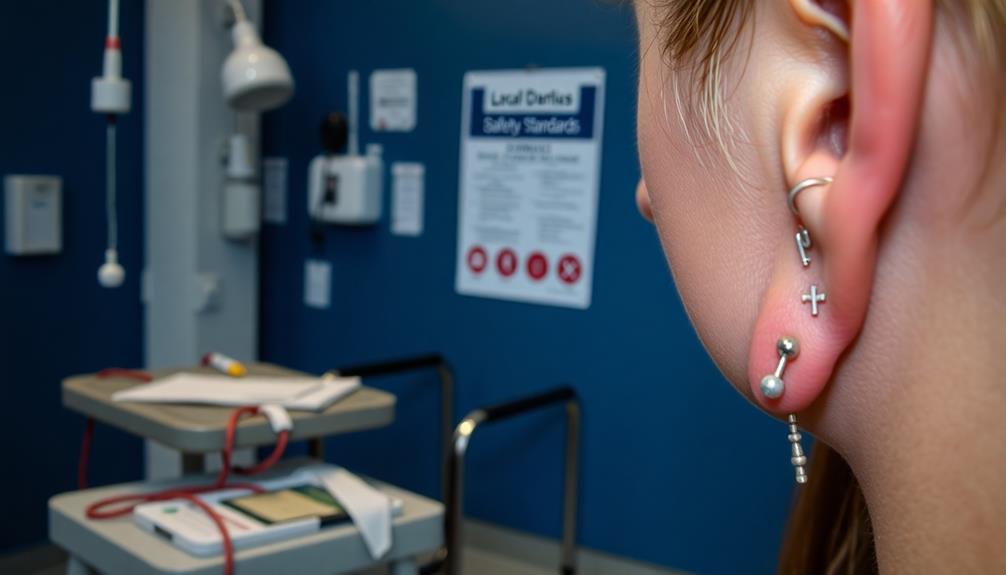
When you get a piercing, it's vital to guarantee that the equipment used meets safety standards.
Using single-use, disposable tools can greatly reduce the risk of infection and keep you eligible to donate blood.
If you're unsure about the equipment or the facility's regulations, it's best to wait three months before considering blood donation.
Safe Piercing Equipment Standards
To guarantee safety during piercings, it's essential to use single-use, disposable equipment. This practice minimizes the risk of infection and guarantees donor safety. Health authorities recommend specific instruments for piercings, including a disposable gun and earring cassette, which meet safe piercing equipment standards.
Here's a quick overview of equipment types and their implications:
| Equipment Type | Safety Implications |
|---|---|
| Disposable Gun | Reduces risk of bloodborne conditions |
| Earring Cassette | Guarantees no reuse, minimizing infection |
| Reusable Instruments | Requires a three-month waiting period for blood donation |
If reusable instruments are used, you must wait three months before donating blood. The same applies if you're unsure about the equipment used. Compliance with these safety measures is essential in preventing the transmission of bloodborne infections, such as hepatitis. By following these guidelines, you can protect yourself and others while maintaining your eligibility to donate blood. So, always opt for safe piercing equipment standards to keep everyone safe.
Infection Prevention Measures
Infection prevention measures are critical for anyone considering body piercings, especially if you plan to donate blood afterward.
The use of single-use, disposable equipment during the piercing procedure is essential for minimizing the risk of infections. If reusable instruments are used, you'll need to wait three months before donating blood to guarantee your safety and that of other blood donors.
It's crucial to choose a piercing studio that complies with state regulations and health standards. This guarantees that the environment is clean, and the equipment is properly sterilized.
Always verify the type of equipment being used; if you're unsure, it's best to wait three months to donate blood. Proper aftercare is equally important. Follow your piercer's instructions to care for your new piercing and reduce the risk of infections.
Understanding the Three-Month Wait
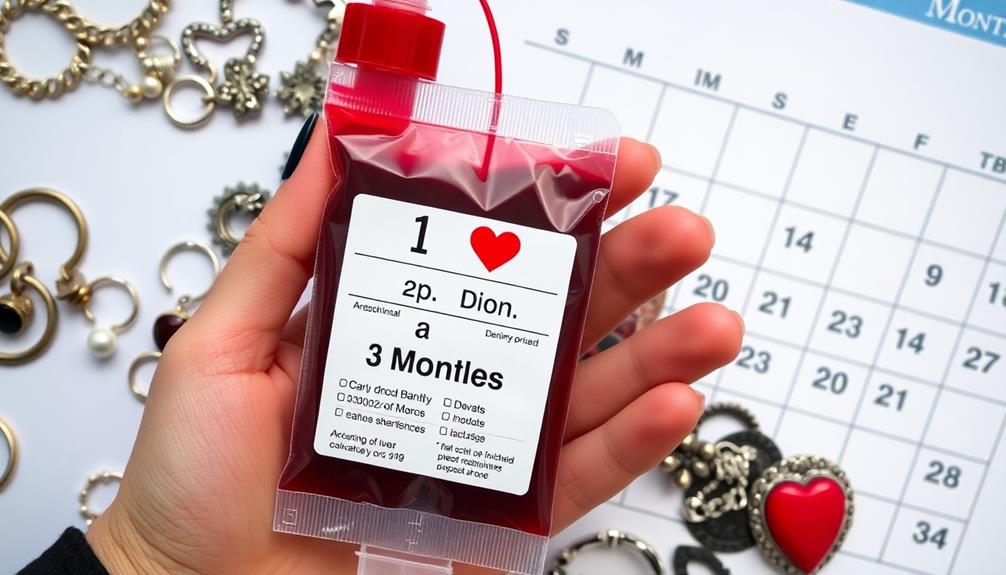
The three-month wait after getting a body piercing isn't just a precaution; it's an essential step to confirm your safety and that of blood recipients. This waiting period helps minimize the risk of infection transmission, particularly concerning bloodborne pathogens like hepatitis B and C, which can arise from non-sterile piercing practices.
If you've had your piercing done with single-use, disposable equipment at a regulated facility, you might be eligible to donate sooner, provided the piercing is fully healed. However, if there's any uncertainty about the equipment used, the three-month wait remains necessary. Compliance with this guideline confirms the safety of both donors and recipients during blood transfusions.
| Factor | Details |
|---|---|
| Infection Risk | Potential introduction of bloodborne pathogens |
| Waiting Period | Three months after body piercing |
| Eligibility | Sooner if done with sterile equipment and fully healed |
| Purpose | Protect donor and recipient from infection risks |
Understanding this three-month wait is key to confirming a safe donation experience for everyone involved.
Regulations for Tattooed Donors
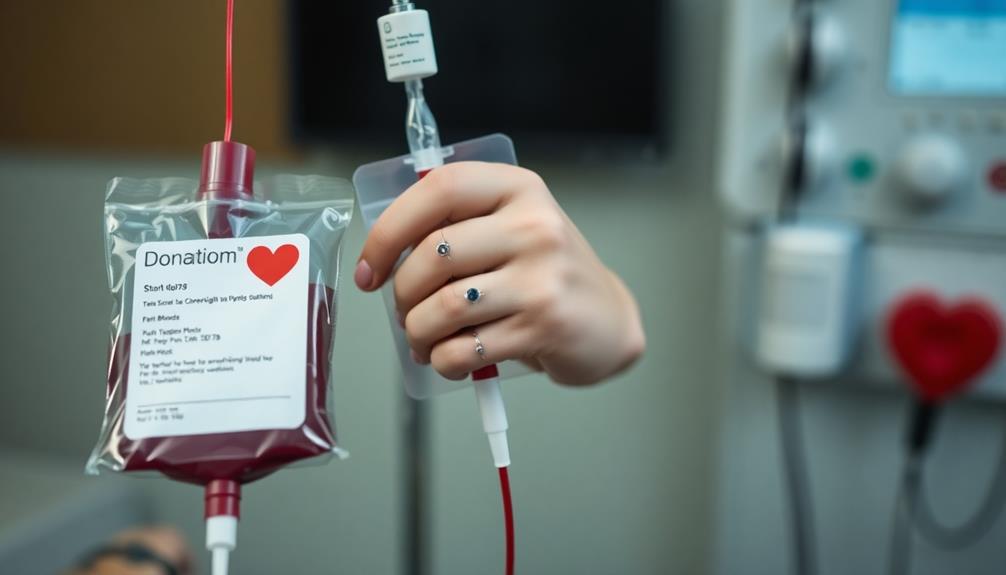
Often, people with tattoos wonder how their ink affects blood donation eligibility. Just like with piercings, there are specific regulations concerning tattoos that you need to be aware of.
If you've recently gotten a tattoo, you'll need to wait at least three months before you can donate blood. This waiting period is in place to reduce the risk of transmitting infections, guaranteeing the safety of the blood supply.
It's important to note that the tattoo must be done in a clean, regulated environment using single-use, disposable equipment.
If your tattoo was performed with reusable instruments or in an unsafe setting, you may face additional eligibility issues. Before you donate, confirm your tattoo is fully healed, showing no signs of infection or irritation.
This precaution helps protect both you and the recipients of donated blood.
Importance of Donor Safety

Guaranteeing donor safety is vital in maintaining a reliable blood supply for those in need. When you decide to donate blood, it's important to be aware of how recent piercings can impact your eligibility.
Strict regulations are in place to protect both donors and recipients from bloodborne conditions, which could arise from improper piercing practices. Here are three key points to keep in mind:
- Waiting Period: After getting a piercing, you must wait at least three months before donating blood. This period helps confirm any potential pathogens introduced during the procedure are eliminated from your system.
- Single-Use Equipment: Donor safety is prioritized by requiring that all piercings be performed using single-use equipment. This reduces the risk of infection and protects the blood supply.
- Health Screenings: Blood donation centers conduct thorough health screenings and require you to disclose any recent piercings. This process helps assess your eligibility and guarantees the safety of everyone involved.
Community Engagement in Blood Donation

You play an essential role in boosting community support for blood donation.
By organizing local events, you can inspire others to contribute and raise awareness about the ongoing need for blood.
Together, we can create a culture of giving that saves lives and strengthens our community.
Importance of Community Support
Community support is essential for boosting awareness and participation in blood donation drives. When you engage with local organizations, schools, and businesses, you create a sense of collective responsibility that encourages more individuals to donate.
This is especially important in educating the public about eligibility concerns related to tattoos or piercings, which can often be misunderstood. Additionally, understanding health and safety practices, such as those related to tick removal from pets, can help reinforce the importance of overall health and readiness for blood donation.
Here are three key ways community support enhances blood donation efforts:
- Incentives: Offering free tickets or refreshments at donation events can attract more donors and make the process enjoyable.
- Education: Collaborating with community leaders and healthcare providers allows for informed discussions about the importance of blood donation and dispels myths surrounding eligibility.
- Long-term Relationships: Regular engagement activities help build lasting connections between blood centers and the communities they serve, ensuring a steady supply of donors.
Organizing Blood Donation Events
Organizing blood donation events is a powerful way to unite community members around a common cause. When you host a blood drive, you create an opportunity for people to come together and donate blood, potentially saving lives.
Collaborating with local organizations like schools or sports clubs helps attract a diverse group of donors. You can offer incentives, such as free tickets or refreshments, to encourage attendance.
Promoting your event through social media and community bulletins can effectively reach a wider audience. Make sure to inform potential donors about the eligibility criteria, ensuring they know what's required to participate.
Providing educational resources at the events is essential, as it debunks myths about blood donation, including misconceptions about cosmetic tattoos and piercings that might affect eligibility.
Hosting events during awareness months, such as Sickle Cell Awareness Month, adds urgency and purpose, motivating community members to donate and support those in need.
Myths Surrounding Blood Donation
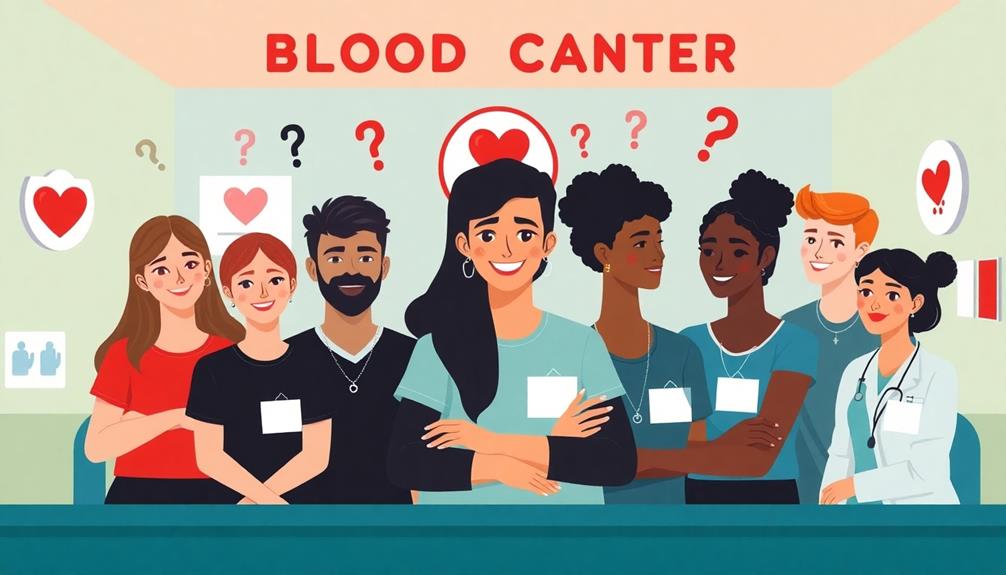
Misconceptions about blood donation eligibility can lead to confusion and misinformation, especially regarding piercings. Many think that having any type of piercing disqualifies you from donating blood, but that's not entirely true.
If your piercing was done with single-use equipment and is fully healed, you may be able to donate plasma immediately or wait just 24 hours for blood or platelets.
Here are three common myths about piercings and blood donation:
- All piercings require the same waiting period: Ear piercings allow plasma donation after 24 hours, while body piercings require a four-month waiting period for blood or platelets.
- Piercings must be healed before donating: You must verify any piercings show no signs of infection or irritation to maintain eligibility.
- Piercings increase infection risk during donation: By following proper aftercare and using safe practices, the risk of infection is considerably minimized.
Resources for Potential Donors
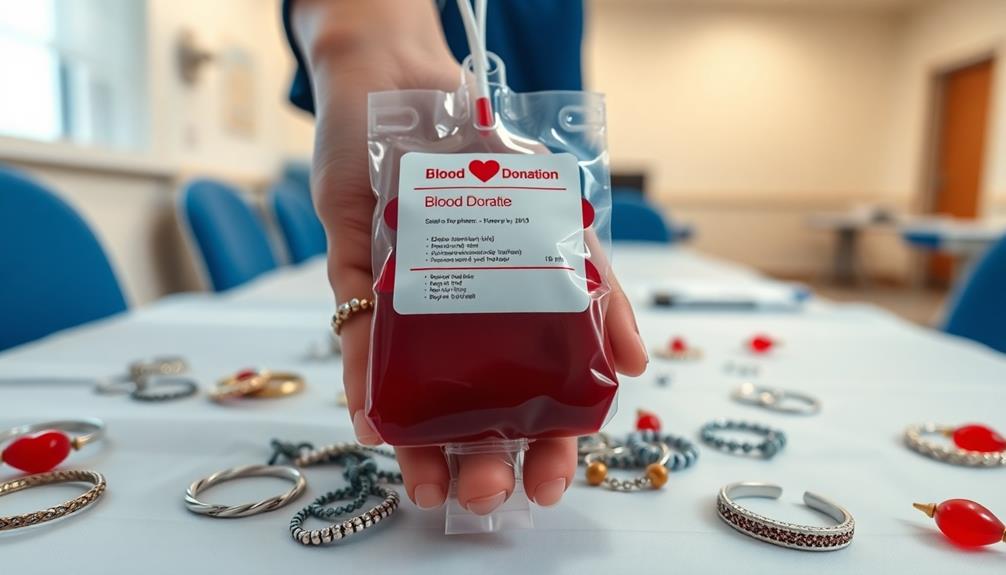
When you're considering donating blood, knowing where to find reliable information can make a big difference. The American Red Cross and America's Blood Centers are excellent resources that provide clear guidelines on eligibility criteria, including rules around piercings. You can access FAQs and educational materials that explain how different types of piercings impact your ability to donate and the necessary waiting periods.
Here's a quick overview of key resources:
| Resource Type | Description | Where to Access |
|---|---|---|
| American Red Cross | Blood donation eligibility criteria | [redcross.org](https://www.redcross.org) |
| America's Blood Centers | FAQs about blood donation | [bloodcenters.org](https://www.bloodcenters.org) |
| Community Blood Drives | On-site assistance with eligibility questions | Local community events |
| Local Health Departments | Information on safe piercing practices | Your local health department's website |
| Online Educational Resources | Detailed guidelines on piercings and donation | Various reputable health websites |
Participating in community blood donation drives not only helps save lives but also provides you with valuable resources to understand your eligibility.
Frequently Asked Questions
How Does a Piercing Affect Blood Donation?
A piercing can affect your blood donation eligibility based on healing status and the type of piercing. If it's fully healed, you might donate soon, but if not, you'll need to wait longer for safety.
What Would Disqualify Me From Donating Blood?
Imagine a gardener nurturing fragile seeds. If you've had recent surgeries, certain illnesses, or high-risk behaviors, you're like those seeds needing time to blossom. These factors can disqualify you from donating blood for safety.
What Happens if You Donate With a New Piercing?
If you donate with a new piercing, you risk infection or complications. It's essential to guarantee your piercing's fully healed and free from irritation to protect both yourself and the recipients of your blood.
What Are Reasons They Won't Let You Donate Blood?
You might feel enthusiastic to donate, but infections, recent surgeries, or certain medications can disqualify you. On the other hand, being healthy and symptom-free opens the door to making a lifesaving contribution.
Conclusion
So, can your piercings really affect your ability to donate blood? The truth is, while they might cause a temporary hold on your eligibility, they don't automatically disqualify you. Just remember the three-month wait after getting a new piercing for your safety and the safety of others. By staying informed and following guidelines, you can play a crucial role in saving lives. Don't let myths hold you back—your contribution is more important than you think!
Hi, my name is Danielle, and I’m an author for piercings-body.com. I have a passion for writing and love to share my knowledge on all things body piercing-related. I’m also a huge advocate for safe body modification practices and believe everyone should be able to make informed decisions about their bodies. When I’m not writing or blogging, I enjoy spending time with my family and friends, practicing yoga, and exploring new places.

